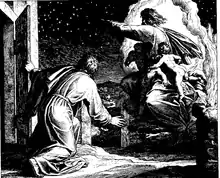Covenant of the pieces
According to the Hebrew Bible, the covenant of the pieces or covenant between the parts (Hebrew: ברית בין הבתרים berith bein hebětarim) was an event in which God revealed himself to Abraham and made a covenant with him, in which God announced to Abraham that his descendants would eventually inherit the Land of Israel. This was the first of a series of covenants made between God and the biblical patriarchs.

Biblical narrative
The biblical story in Genesis 15:1–15 recounts the covenant of the pieces. The day started with a vision in which Abram expressed his concerns about being childless. God tells Abram that he would have a son born to him, asks him to count the stars, if possible, and promises "So shall thy seed be." God commands Abram to prepare an animal sacrifice. Abram performed the sacrifice, cutting the animals (except the birds) into two pieces.[1]
As the sun was going down, Abram fell into a deep sleep. God prophesied to Abram that his seed would be strangers in a land that is not theirs (a strange land) and serve the rulers of the land for four hundred years but afterward, they would come out with "great substance" and in the fourth generation, they would return to Canaan.
Yahweh declared all of the regions of land that Abram's offspring would claim:
"In that day the LORD made a covenant with Abram, saying: 'Unto thy seed have I given this land, from the river of Egypt unto the great river, the river Euphrates; the Kenite, and the Kenizzite, and the Kadmonite, and the Hittite, and the Perizzite, and the Rephaim, and the Amorite, and the Canaanite, and the Girgashite, and the Jebusite.'

The covenant found in Genesis 12-17 is known in Hebrew as the Brit bein HaBetarim, the "Covenant Between the Parts." The covenant was for Abraham and his seed, or offspring,[2] both of natural birth and adoption.[3]
In Genesis 12–17 three covenants (or developments of the covenant) can be distinguished. According to the documentary hypothesis these covenants are based on the differing Jahwist, Elohist and Priestly sources.[4] In Genesis 12 and 15, God grants Abram land and descendants but does not place any stipulations (unconditional). By contrast, Gen. 17 contains the covenant of circumcision (conditional).
- To make of Abraham a great nation and to bless those who bless him and curse those who curse him and all peoples on earth would be blessed through Abraham.[Gen 12:1–3]
- To give Abraham's descendants all the land from the river (or wadi) of Egypt to the Euphrates.[Gen 15:18–21] Later, this land came to be referred to as the Promised Land or the Land of Israel.
- To make Abraham the father of many nations and of many descendants and give "the whole land of Canaan" to his descendants.[Gen 17:2–9]
- Circumcision is to be the permanent sign of this everlasting covenant with Abraham and his male descendants and is known as the brit milah.[Gen 17:9–14]
See also
References
- Genesis 15:9
- "Blue Letter Bible: Dictionary and Word Search for zera` (Strong's 2233)". 2011. Archived from the original on 2011-10-12. Retrieved 2011-11-21.
- Genesis 17:11–13 And ye shall circumcise the flesh of your foreskin; and it shall be a token of the covenant betwixt me and you. And he that is eight days old shall be circumcised among you, every man child in your generations, he that is born in the house, or bought with money of any stranger, which is not of thy seed. He that is born in thy house, and he that is bought with thy money, must needs be circumcised: and my covenant shall be in your flesh for an everlasting covenant.
- Michael D. Coogan, A Brief Introduction to the Old Testament, (Oxford: Oxford University Press, 2009), 62–68